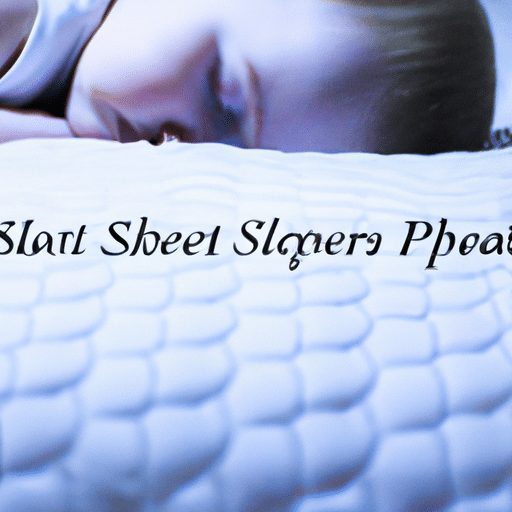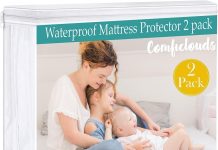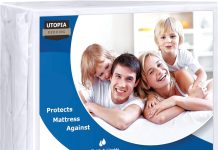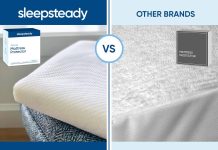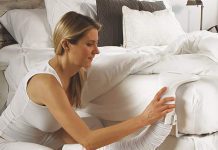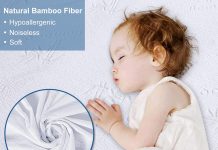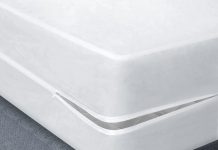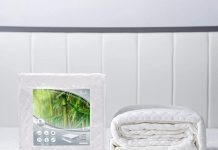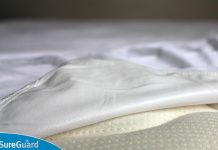Have you ever wondered if mattress protectors make noise? Well, worry no more because we have the answer for you! Mattress protectors are designed to provide an added layer of protection to your mattress, shielding it from spills, stains, and dust mites. But do they come at a cost of a noisy night’s sleep? In this article, we will debunk the myth surrounding mattress protectors and reveal whether or not they actually make noise. So, sit back, relax, and let us ease your concerns about this common bedding accessory.
Review contents
Noise Level of Mattress Protectors
Material of the Mattress Protector
When it comes to the noise level of a mattress protector, the material plays a significant role. Some materials are inherently noisier than others, so it’s important to consider this when selecting a mattress protector. Generally, mattress protectors made of materials like vinyl or plastic tend to be louder when you move around on them. On the other hand, mattress protectors made of fabrics such as cotton or microfiber are typically quieter and produce less noise during movement.
Thickness of the Mattress Protector
Another factor that can affect the noise level of a mattress protector is its thickness. Thicker mattress protectors may produce more noise when you move on them, while thinner ones tend to be quieter. However, it’s important to note that the noise level can also depend on the specific type of material used within the thickness of the protector.
Installation Method
The way a mattress protector is installed can also impact its noise level. Some mattress protectors come with fitted elasticized corners, which provide a snug and secure fit to the mattress. These types of protectors are less likely to produce noise since they stay in place, even with movement. On the other hand, mattress protectors that are simply placed on top of the mattress without any secure fastening can shift and create noise when you move around in bed.
Presence of Coatings or Treatments
Certain mattress protectors may have coatings or treatments applied to them, which can affect their noise level. These coatings or treatments can either reduce or increase the noise produced. For example, some protectors may have a noise-reducing coating that minimizes the sound when you move. On the other hand, protectors with waterproofing treatments may produce more noise due to the nature of the materials used.
Use of Waterproofing
Waterproof mattress protectors are a popular choice for many people as they offer protection against spills, stains, and liquid damage. However, it’s important to note that waterproofing can contribute to the noise level of the protector. The waterproof layers or materials used in these protectors can sometimes be noisy when you move on them. It’s essential to strike a balance between the level of waterproofing you require and the noise level you can tolerate.
Quality of Construction
The overall quality of construction plays a crucial role in determining the noise level of a mattress protector. Poorly constructed protectors may have loose seams or poor stitching, which can result in more noise when you move. On the other hand, well-constructed protectors with reinforced seams and quality materials are more likely to minimize noise and provide a quiet sleep experience. It’s worth investing in a high-quality mattress protector to ensure a peaceful night’s sleep.
Effects on Sleep Quality
Disturbance caused by Noise
The noise produced by a mattress protector can have a significant impact on sleep quality. Loud and disruptive noises can disturb your sleep and make it difficult to stay asleep throughout the night. The movement-related noise from a noisy mattress protector can be particularly bothersome, especially if you are a light sleeper or easily awaken by sound. It’s important to consider the noise level of a mattress protector to ensure a peaceful and undisturbed sleep environment.
Individual Sensitivity to Noise
Each person has a different level of sensitivity to noise. While some individuals may not be bothered by the noise of a mattress protector, others may find it highly disruptive and irritating. It’s important to consider your own sensitivity to noise when selecting a mattress protector. If you are someone who is easily disturbed by noise, it’s recommended to opt for a quieter mattress protector to ensure a restful sleep.
Soundproofing Solutions
For those who are particularly sensitive to noise or have a noisy mattress protector, there are various soundproofing solutions that can help minimize the disturbance. Using a white noise machine or a fan can help drown out the noise and create a more conducive sleep environment. Additionally, investing in a soundproof mattress pad or topper can provide an extra layer of noise insulation and help reduce any sounds produced by the mattress protector.
Alternatives to Noisy Mattress Protectors
If noise is a significant concern for you and you find that mattress protectors are consistently noisy, there are alternatives to consider. Some mattress manufacturers offer mattresses with built-in protectors or technologies that provide a noise-free sleeping experience. Another alternative is to opt for mattress encasements, which fully enclose the mattress and provide protection without the noise associated with traditional mattress protectors. Exploring these options can help ensure a quiet and restful sleep without compromising on protection.
Choosing a Quiet Mattress Protector
Researching and Reading Reviews
When choosing a mattress protector, it’s important to do thorough research and read reviews from other customers. Look for specific feedback on the noise level of the protector and pay attention to any consistent complaints or praises regarding noise. Considering the experiences of others can provide valuable insights and help you make an informed decision.
Testing the Product
While researching and reading reviews can be helpful, it’s also beneficial to test the mattress protector yourself if possible. If you have the opportunity to visit a physical store, try to feel the material and test the noise level by moving around on it. This hands-on approach can give you a better idea of how the mattress protector performs in terms of noise and overall comfort.
Opting for Noise-Reducing Features
When shopping for a mattress protector, look for specific features that are designed to reduce noise. Some protectors may have noise-reducing coatings or treatments applied, while others may have specialized materials that minimize noise. Additionally, look for protectors that have noise-reducing technologies incorporated into their design, such as extra padding or layers that absorb sound.
Considering Budget and Durability
While noise level is an important factor to consider, it’s also essential to take into account your budget and the durability of the mattress protector. Balance your desired noise level with the price you are willing to pay and the longevity of the protector. It’s best to invest in a protector that not only meets your noise requirements but also provides durability and value for money.
Maintaining a Noise-Free Mattress Protector
Following Manufacturer Guidelines
To ensure a noise-free sleep experience, it’s important to follow the manufacturer’s guidelines for maintenance and care. These guidelines will provide directions on how to properly clean and care for the mattress protector. By following these instructions, you can maintain the protector’s quality and minimize any potential noise caused by improper handling.
Proper Cleaning and Care
Regular cleaning and maintenance are vital in keeping a mattress protector free of noise. Follow the recommended cleaning instructions, which may include machine washing, gentle cycle, or spot cleaning. It’s important to remove any stains or spills promptly to prevent them from seeping into the mattress protector, which could result in more noise. By keeping the protector clean and well-maintained, you can help prolong its lifespan and ensure a noise-free sleeping experience.
Replacing Worn Out Protectors
Over time, mattress protectors may become worn out or lose their noise-reducing properties. It’s important to regularly assess the condition of the protector and replace it if necessary. If you notice significant noise or deterioration in the protector, it may be time to invest in a new one. Replacing worn out protectors can help maintain a noise-free sleep environment and ensure optimal protection for your mattress.
Using a Mattress Pad or Topper
If you find that your mattress protector is still producing noise despite proper maintenance and care, consider using a mattress pad or topper as an additional layer of noise insulation. These products can help absorb sound and minimize any noise created by the protector. Additionally, mattress pads or toppers can provide added comfort and support, enhancing your overall sleep experience.
Common Myths and Misconceptions
All Mattress Protectors Make Noise
This is a common misconception. While it’s true that some mattress protectors may produce noise, not all of them are noisy. By carefully selecting a quiet mattress protector or exploring alternative options, you can enjoy a noise-free sleep environment without sacrificing protection.
Only Low-Quality Protectors Make Noise
While low-quality protectors may be more prone to noise issues, it’s not solely limited to them. Even some high-quality protectors may produce noise depending on various factors such as material, thickness, and installation method. It’s important to consider all these factors when choosing a mattress protector to ensure a quiet and restful sleep.
Noise Disappears with Time
Contrary to popular belief, noise produced by a mattress protector is unlikely to disappear with time. If the noise persists even after proper maintenance and care, it may indicate a design flaw or material issue. It’s best to address the noise issue by exploring alternative options or replacing the protector if necessary.
Conclusion
When it comes to selecting a mattress protector, considering the noise level it produces is essential for a peaceful and undisturbed sleep experience. Factors like material, thickness, installation method, presence of coatings or treatments, use of waterproofing, and quality of construction can all influence the noise level of a mattress protector. By researching, testing, and considering noise-reducing features, you can choose a mattress protector that meets your desired noise requirements. Proper maintenance and care, along with the use of additional products like mattress pads or toppers, can help maintain a noise-free sleep environment. Dispelling common myths and misconceptions about mattress protector noise ensures that you make an informed decision and achieve the quiet and restful sleep you deserve.

